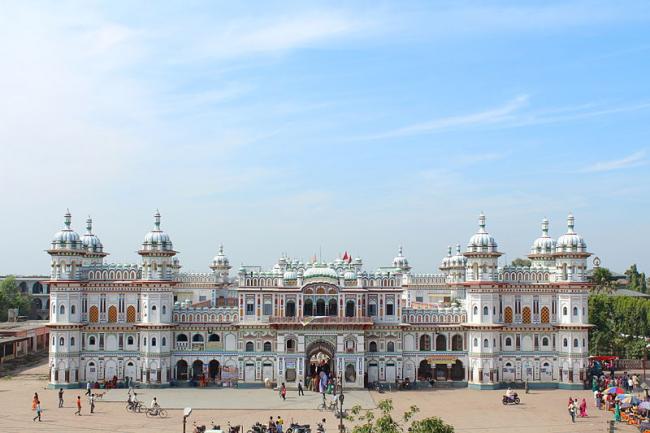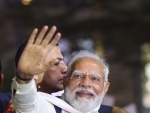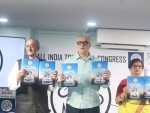
Political Breakthrough
According to the agreement, the country would be federated into eight federal states on the basis of five factors of identity - ethnicity/community, language, culture, geographical and regional continuity and history; and four factors of capability - economic capability, infrastructure potential, availability of natural resources and administrative feasibility.
The four parties command more than 465 seats in the 601-member Constituent Assembly (CA), sufficient to endorse the new Constitution.
Welcoming the agreement, United Nations (UN) Secretary General Ban Ki-moon in a statement issued on June 8, 2015, declared, "The UN applauded the diligent efforts and constructive leadership demonstrated by Nepali political leaders in reaching the agreement. This achievement is particularly laudable as it was reached amid challenging circumstances caused by the major earthquakes of April and May." Nepal was hit twice by massive earthquakes during a span of less than one month, on April 25, 2015 (7.8 magnitude) and May 12, 2015 (7.3 magnitude) in which, according to Government data, at least 8,702 people were killed and another 22,220 sustained injuries; and property worth Nepalese Rupee (NPR) 100 billion was destroyed.
Meanwhile, a day after the major parties signed the 16-point agreement, a meeting of the CA Plenary on June 9, 2015, forwarded the agreement to the CA's Constitutional Political Dialogue and Consensus Committee (CPDCC), in order to formalize the agreement, as it had not clearly spelled out the details of the proposed system of federalism, the most contentious of all issues that have held up the Constitution drafting process. On June 10, 2015, the CPDCC formed a six-member Sub-committee headed by NC General Secretary Purna Bahadur Khadka, to forge an agreement on the remaining disputed issues. UCPN-M General Secretary Krishna Bahadur Mahara, CPN-UML Secretary Gokarna Bista, Rastriya Prajatantra Party-Nepal (RPP-N) Chief Whip Dilanath Giri, Tharuhat Tarai Party (TTP) Advisor Gopal Dahit and Samajbadi Janata Party (SJP) Chaiman Prem Bahadur Singh, are the members of the Sub-committee. But, as the Sub-committee failed to forge consensus in its meeting on June 11, 2015, the responsibility of securing an agreement on residual issues such as the transitional governance, some terminology of the preamble of the new Constitution, and the draft of Constitution amendment, was handed back to the CPDCC itself.
Remarkably, in view of the obstructive approaches of the past, the CPDCC pushed forward, clearing the way for the finalization of the first draft of the new Constitution, submitting a consensus report on the disputed agendas of the statute to the CA on June 11, 2015. The report presented by CPDCC Chairman Baburam Bhattarai was forwarded to the Constitution Drafting Committee (CDC) after deliberations in the full House of the CA on June 12, 2015. Meanwhile, the CDC headed by NC leader Krishna Prasad Sitaula will have to prepare the first draft of the Constitution within 15 days. If everything goes as planned, the new Constitution will be promulgated by mid-July.
Expectedly, opposing the 16-point agreement, the UCPN-M-led 30-party opposition alliance, which started collaboration following the second CA elections, split into two on June 9, 2015. While 13 of the constituent parties supported the deal (all 13 are represented in the CA), 17 parties opposed the deal (of which only five are represented in the CA). The 13 parties supporting the deal attended the meeting called by UCPN-M Chairman Dahal at Singha Durbar (The Lion Palace), the official seat of Government in Kathmandu. They hailed the agreement as "historic" and decided to join the CA from June 9, 2015, itself. The other 17 parties attended the meeting called by Tarai Madhes Democratic Party (TMDP) Chairman Mahantha Thakur, at the same venue and on the same day and concluded that the deal is regressive. They agreed in principle to form a new front without UCPN-M and MJF-L, and to continue their struggle for identity-based federalism.
Earlier, on June 8, 2015, arguing that the agreement failed to resolve the issue of federalism, TMDP Vice Chairman Hridayesh Tripathi asserted, "If the major parties sign any deal without finalizing the issue of federalism, we would walk out of the alliance and the Constituent Assembly (CA)." Similarly, Sadbhavana Party (SP) Chairman Rajendra Mahato had said on June 8, 2015, "Federalism is the major agenda of recent political changes. So we cannot move ahead without deciding the issue of federalism. It would be a political dishonesty." Likewise, on June 8, 2015, Federal Socialist Party (FSP) Chairman Ashok Rai termed the agreement a 'baseless and faceless proposal'.
The 16-point agreement also triggered rifts in various other opposition alliances. On June 10, 2015, a day after the split of the 30-party alliance, four major parties in the United Democratic Madhesi Front (UDMF) - Madhesi People's Rights Forum Nepal (MPRF-N), TMDP, SP and National Madhes Shadbhavana Party (NMSP) - decided to oust the Bijay Gachhadar-led MJF-L from the front for signing the deal, despite opposition in the camp.
Similarly, terming the UCPN-M decision to sign the 16-point deal a betrayal, Mohan Baidya aka Kiran, Chairman of the Communist Party of Nepal-Maoist (CPN-Maoist-Baidya) during a Press meet at the party office in Buddha Nagar, Kathmandu, on June 10, 2015, noted that the five-Maoist parties alliance no longer exists. UCPN-M had formed an alliance with the CPN-Maoist-Baidya, the Matriya Yadav-led CPN-Maoist (CPN-Maoist-Matriya), the Mani Thapa-led Revolutionary Communist Party (RCP) and Pari Thapa-led CPN-Unified (CPN-U) on June 28, 2014, to exert pressure on the ruling parties for adopting identity-based federalism.
Earlier, demanding that the new Constitution should be written on the basis of consensus among the key stakeholders of the peace process, the UCPN-M-led 30 party-opposition alliance had called for a three-day nationwide general shutdown between April 7 and 9, 2015. At least 24 persons, including eight Security Force (SF) personnel, had sustained injuries in clashes that had erupted during the first day of the shutdown in various parts of Nepal. On April 7, 2015, the alliance decided to call off its general shutdown planned for April 8 and April 9, following calls from several quarters.
Though the parties have agreed to start the drafting process, some minor provisions of the Constitution remain unsettled. The parties were split over how to describe "Maoist insurgency" in the new Constitution: the Maoists want to term it "people's war" while the NC and the CPN-UML say it may be called "armed insurgency". The NC took a stance that "pluralism" should be incorporated into the Constitution, which the UCPN-M opposed. The parties also debated terms such as "inclusive" and "proportional representation of oppressed and marginalized communities". The parties, however, agreed to continue negotiations on the contentious issues while the draft is being 'readied'.
Despite persisting difficulties, the 16-point agreement between the four major parties constitutes a major political breakthrough, and the Constitution-making process is now likely to move ahead relatively smoothly, since the political forces commanding an overwhelming majority in the 601-seat CA have agreed to expedite the drafting process based. However, there are several lacunae and ambiguities in the agreement, particularly on federalism, and the political parties will once again have to negotiate the details of the federal structure. There is also an urgent need for the parties to provide clarity on various other issues, and not get caught up in triumphalism. The 16-point agreement creates a critical opportunity, but can be jeopardized by new confrontations, mistrust and confusion, to once again scupper the Constitution drafting project.
Support Our Journalism
We cannot do without you.. your contribution supports unbiased journalism
IBNS is not driven by any ism- not wokeism, not racism, not skewed secularism, not hyper right-wing or left liberal ideals, nor by any hardline religious beliefs or hyper nationalism. We want to serve you good old objective news, as they are. We do not judge or preach. We let people decide for themselves. We only try to present factual and well-sourced news.







